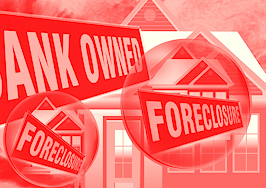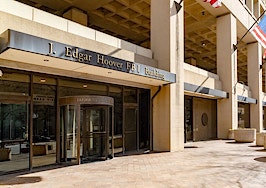In these times, double down — on your skills, on your knowledge, on you. Join us August 8-10 at Inman Connect Las Vegas to lean into the shift and learn from the best. Get your ticket now for the best price.
Most FHA borrowers who sought forbearance relief from their mortgage payments during the coronavirus pandemic weren’t provided with the correct assistance after their forbearance ran out, according to two audit reports made public by a federal housing watchdog Thursday.
Nearly half of FHA borrowers coming out of forbearance weren’t offered the correct loss mitigation assistance, such as a loan modification, or their options weren’t calculated correctly, the U.S. Department of Housing and Urban Development’s Office of Inspector General (HUD OIG) concluded in a broad audit of the industry as a whole.
About 1-in-4 borrowers received the correct loss mitigation options, “but servicers did not follow COVID-19 loss mitigation guidance to help borrowers with payments that were missed during forbearance,” the HUD OIG audit concluded.
“The impact of HUD’s COVID-19 loss mitigation program cannot be overstated,” HUD OIG said in an announcement. “When servicers provided borrowers with proper loss mitigation assistance, it helped borrowers make their mortgage payments. However, when servicers failed to provide borrowers with proper loss mitigation assistance, HUD OIG found that this sometimes made the borrower’s financial situation worse.”
Loan servicing giant Mr. Cooper, which was the subject of the other HUD OIG audit, said in a statement that the company was “deeply disappointed” in the report’s focus on findings that were often “very technical in nature” rather than on borrower outcomes.
“Most importantly, none of the homes in the sample population were foreclosed upon, and the vast majority of customers were provided solutions that brought them current on their loans, often resulting in material payment savings,” Mr. Cooper said in a statement provided to Inman.
In its audit of Mr. Cooper — the “doing business name” of Nationstar Mortgage LLC — HUD OIG alleged that the company failed to provide the proper loss mitigation assistance to 83 percent of FHA borrowers after their COVID-19 forbearance ended.
In a nine-page response to HUD OIG, Mr. Cooper executive Jay Jones said the audit contained factual inaccuracies and mischaracterized the assistance that Mr. Cooper provided to homeowners.

Jay Jones
“During the pandemic, Mr. Cooper assisted more than 550,000 customers, including approximately 170,000 FHA customers, as they went on pandemic forbearance plans,” Jones said in a response that was included at the end of the full audit report. “As of this month, approximately 90 percent of those customers have received post-forbearance assistance or otherwise became current on their loan.”
Mr. Cooper said the HUD OIG audit looked at a sample of 67 loans from a population of customers who exited forbearance without first entering a permanent loss mitigation option. The company says it offered permanent loss mitigation solutions to 59 out of the 60 borrowers that HUD OIG said weren’t handled properly and that 53 of those borrowers accepted and brought their loans current.
Of the remaining six borrowers HUD OIG says were mishandled, Mr. Cooper said three had paid their loans off or were in active loss mitigation review, and two had been transferred to another servicer. Only one loan was not in active loss mitigation review, Mr. Cooper said.
During the pandemic, Jones said Mr. Cooper “sought, in good faith, to quickly implement HUD’s new, complex loss mitigation options in order to assist homeowners in need. While there were some limited, technical exceptions in addressing FHA guidelines … those exceptions do not reflect broad non-compliance with HUD’s loss mitigation requirements, but rather reflect the practical difficulties Mr. Cooper encountered.”
‘Extortion tactics’ as tool for regulation
Last fall, another big loan servicer, Carrington Mortgage Services, cast itself as a victim of “extortion tactics” in agreeing to pay $5.25 million to settle allegations by the Consumer Financial Protection Bureau that it made mistakes in implementing borrower protections granted to homeowners during the pandemic.
The CFPB alleged that Carrington Mortgage Services misrepresented to borrowers that they could not have 180 days of forbearance upon request, wrongly imposed fees and reported false information to credit reporting companies.
In reaching a settlement with the CFPB, Carrington denied wrongdoing, saying it had acted in good faith in trying to help borrowers affected by the COVID-19 pandemic.
“The CFPB’s use of extortion tactics as its primary tool for regulation does nothing to help the industry or consumers,” Carrington Cos. founder and CEO Bruce Rose said in a statement at the time. “Ultimately, it is consumers who eventually pay more because of the additional regulatory costs imposed on lending and servicing.”
CFPB Director Rohit Chopra said in a blog post Thursday that the bureau intends to identify ways to simplify and streamline existing mortgage servicing rules.
“Last fall, the CFPB asked the public for input on ways to reduce risks for borrowers who experience disruptions in their ability to make mortgage payments, including input on the mortgage forbearance options available to borrowers,” Chopra wrote. “In particular, we sought input on the features of pandemic-related forbearance programs and whether there are ways to automate and streamline long-term loss mitigation assistance.”
Commenters told the CFPB that borrowers seeking help “can face a paperwork treadmill that hurts both homeowners and mortgage servicers,” Chopra wrote.
The HUD OIG audits recommended that HUD work with mortgage servicers to determine reasons for noncompliance and develop mitigation plans. HUD OIG also recommended that HUD “review loans that did not receive appropriate loss mitigation options to ensure that the servicers provide a remedy to impacted borrowers and where appropriate, take administrative action.”

Rae Oliver Davis
“It goes without saying that the COVID-19 pandemic was unprecedented in the ways in which it impacted Americans, including those with FHA-insured loans,” HUD OIG Inspector General Rae Oliver Davis said in a statement. “HUD’s efforts to address the crisis necessarily evolved over time and mortgage servicers struggled to adapt to those changes. These reports identify the challenges and provide a roadmap to assist HUD in avoiding similar difficulties in the future.”
How borrowers have fared
If continued Federal Reserve tightening pushes the U.S. into a recession, loan servicers will play an important role in keeping borrowers from losing their homes in foreclosure.
But for now, mortgages continue to perform well. The percentage of homeowners who are considered “seriously delinquent” because they haven’t made a mortgage payment in 90 days has declined in the last year to roughly pre-pandemic levels. While more than 200,000 homes are in foreclosure, more than 10 times as many homes were in jeopardy at the height of the 2007-09 Great Recession.
According to a recent analysis by Black Knight, 1.4 percent of homeowners were seriously delinquent in April, down from 1.87 percent at the same time a year ago. While 502,000 borrowers were seriously delinquent, that’s down from 1.946 million in April 2021, when the pandemic was just beginning.
Loan servicers started foreclosure proceedings in April on 4.9 percent of seriously delinquent borrowers. But only 24,800 homes entered the foreclosure process — the lowest level since September 2022. All told, 234,000 homes were in some stage of foreclosure in April, compared to 2.909 million in December 2009.
Current status of COVID-19-related forbearances

Source: Black Knight Mortgage Monitor
Black Knight data shows that the vast majority of the 8.5 million borrowers who were granted COVID-19-related forbearance during the pandemic have successfully exited the program, with 51 percent current on their loans and another 35 percent having paid off their loans by refinancing or selling their homes.
But 4 percent of borrowers whose forbearance has expired — about 377,000 homeowners — are delinquent on their loans. Another 100,000 borrowers who were granted forbearance are in foreclosure and 74,000 lost their homes.
Another 412,000 borrowers who were granted COVID-19-related forbearance are still in active forbearance, including 270,000 homeowners whose forbearance was extended.
Status of COVID-19 forbearances by plan exit month

Source: Black Knight Mortgage Monitor
Black Knight data also shows that borrowers exiting forbearance plans in recent months are more likely to be in a loss mitigation plan, delinquent on their loan or in foreclosure.
Editor’s note: This story has been updated to note that Consumer Financial Protection Bureau Director Rohit Chopra says the CFPB intents to simplify and streamline existing mortgage servicing rules.
Get Inman’s Mortgage Brief Newsletter delivered right to your inbox. A weekly roundup of all the biggest news in the world of mortgages and closings delivered every Wednesday. Click here to subscribe.












